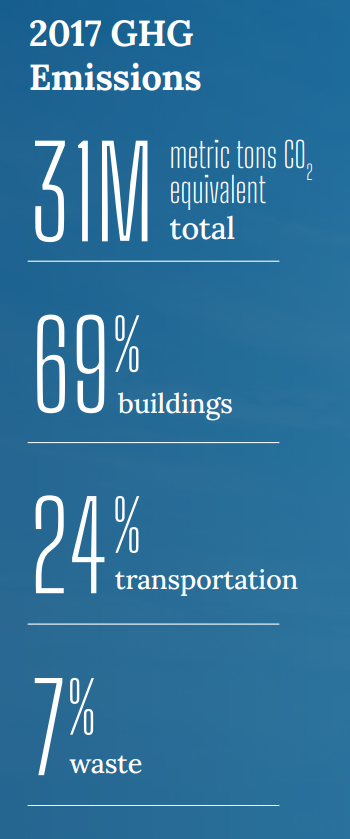Electrify Chicago
An independent tool for viewing City of Chicago building data
According to the
2022 Chicago Climate Action Plan,
69% of Chicago's emissions come from buildings, making
building emissions our biggest challenge and our biggest opportunity as a city
to tackle climate change. At Electrify Chicago, we showcase building performance using
publicly available data supplemented by community-submitted photographs and building
owners.
Start by looking at Chicago's buildings with the highest greenhouse gas intensity i.e. emissions per square foot. Large, efficient, buildings can perform much better than very inefficient small buildings on this metric.
New Article
📰 $30 Million In Missed Fines
The City Of Chicago failed to collect $30 million in potential fines from the building benchmarking ordinance, reducing transparency and accountability.
Legislative update! 🎉
As of late January 2024, legislation is being introduced to require new use more efficient forms of water and space heating, via the Clean And Affordable Buildings Ordinance (CABO), which will reduce the number of highly polluting and inefficient buildings that end up on this site.
If you're in Chicago,
write to your alderman to support the CABO!
Chicago Buildings by Greenhouse Gas Intensity
Note: Data includes large Chicago buildings with data from 2022, unless explicitly stated otherwise.
Note: This data only includes buildings whose emissions are reported
under the
Chicago Energy Benchmarking Ordinance. According to the City “As of 2016,
this list includes all commercial, institutional, and residential buildings larger than
50,000 square feet.” This dataset is also then filtered to only buildings with
reported emissions > 1,000 metric tons CO2 equivalent.
The latest year of data is from 2022, but we update the site regularly when new data is available, and some buildings may have failed to report that year, and only have older data available.
| Property Name / address | Primary Property Type |
Greenhouse Gas Intensity (kg CO2 eq./sqft) |
Total Greenhouse Emissions (metric tons CO2 eq.) |
|---|---|---|---|
|
3001 S MICHIGAN AVE
3001 S MICHIGAN AVE
| Multifamily Housing | 7.1 kg/sqft
Highest 37%
| 1,482 tons
Highest 32%
|
|
ParkView at River East Condominium Association
505 N McClurg Ct
| Multifamily Housing | 7.1 kg/sqft
Highest 37%
| 3,096 tons
Highest 13%
|
|
Plaza 440 Private Residences
440 N Wabash Ave
| Multifamily Housing | 7.1 kg/sqft
Highest 37%
| 3,376 tons
Highest 11%
|
|
The Fordham Condominium Association
25 E Superior St
| Multifamily Housing | 7.1 kg/sqft
Highest 37%
| 4,169 tons
Highest 9%
|
|
21 W. Chestnut Condominium Association
21 W Chestnut St
| Multifamily Housing | 7.1 kg/sqft
Highest 37%
| 1,198 tons
Highest 39%
|
|
201 E Chestnut St
201 E Chestnut St
| Multifamily Housing | 7.1 kg/sqft
Highest 37%
| 1,427 tons
Highest 33%
|
|
209 East Lake Shore Drive
209 E LAKE SHORE DR
| Multifamily Housing | 7.1 kg/sqft
Highest 37%
| 1,825 tons
Highest 25%
|
|
5200 5208 S BLACKSTONE AVE
5200 5208 S BLACKSTONE AVE
| Multifamily Housing | 7.1 kg/sqft
Highest 37%
| 1,056 tons
Highest 43%
|
|
808 812 W JUNIOR TER
808 812 W JUNIOR TER
| Multifamily Housing | 7.1 kg/sqft
Highest 37%
| 545 tons
Lowest 30%
|
|
2335 2345 N GENEVA TER
2335 2345 N GENEVA TER
| Multifamily Housing | 7.1 kg/sqft
Highest 37%
| 462 tons
Lowest 22%
|
|
222 West Hubbard Street
222 W Hubbard St
| Office | 7.1 kg/sqft
Highest 37%
| 470 tons
Lowest 23%
|
|
935 W. Chestnut
🕰️
935 W. Chestnut
| Office | 7.1 kg/sqft | 512 tons |
|
5858 N Broadway
🕰️
5858 North Broadway Street
| Multifamily Housing | 7.1 kg/sqft | 486 tons |
|
Tree Studios
601 - 623 N State St
| Retail Store | 7.1 kg/sqft
Highest 37%
| 395 tons
Lowest 16%
|
|
Yusuf North
🕰️
2753 W North Ave
| Office | 7.1 kg/sqft | 354 tons |
Data Source:
Chicago Energy Benchmarking Data
